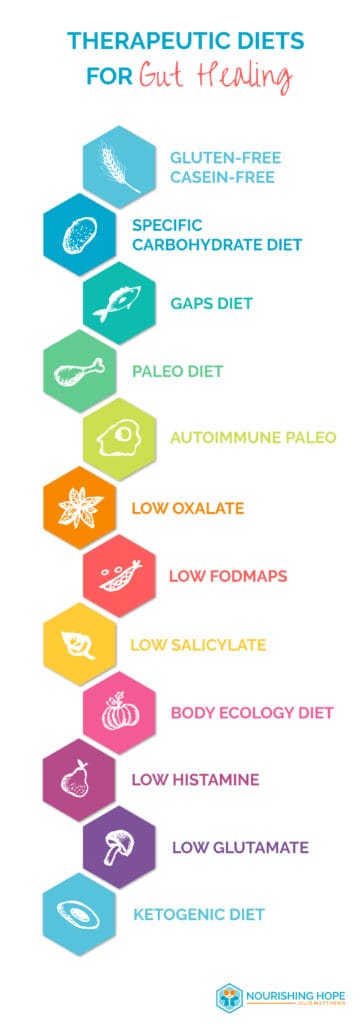
Gastrointestinal Problems and Developmental Delays
Gastrointestinal problems and developmental delays are often connected. According to one study, children with autism, as well as ADHD and other developmental delays, have higher rates of medical conditions than their peers. These medical diagnoses include: diarrhea or colitis, food allergies, asthma, eczema, headaches and earaches.[1] It’s a substantive finding, involving a large sample size: 41,000 children aged 3 to 17 years. 5,469 children had one or more of the following diagnoses: autism, intellectual disability, ADHD, learning disability or other developmental delay.
The study found children with developmental disabilities were 3.5 times more likely to have had frequent diarrhea or colitis during the past year. As well as 1.8 times more likely to have had a food allergy during the past year. They were also significantly more likely to have skin allergy, asthma, ear infections, and severe headaches.
When they compared the developmental disability groups to each other they discovered: “Children with autism were twice as likely as children with ADHD, learning disability or other developmental delay to have had frequent diarrhea or colitis during the past year. They were seven times more likely to have experienced these gastrointestinal problems than were children without any developmental disability.”
These findings are important because parents are routinely told one has nothing to do with the other. However, the gut and brain are closely connected, such that the gut is often called “the second brain.”
When the gastrointestinal system is not functioning properly, children and adults struggle with mood, behavior, focus, and thinking.
Your child may not be able to:
- Break down and absorb nutrients properly, leading to deficiency that can affect cognition, mood, and behavior.
- Digest the protein in wheat, dairy, and soy, which form opioid (morphine-like) compounds that negatively affect attention, learning, and behavior.
- Maintain a healthy gut microbiome – pathogenic microorganisms can negatively affect our neurotransmitter levels and cause hyperactivity, aggression and other mood related symptoms.
Parents are often frustrated. All too often I hear from parents like you that their child’s gastrointestinal issues (such as chronic diarrhea) are dismissed by their health care professional as “just the autism” or “unrelated to their ADHD or anxiety.”
The good news is your intuition is right.
Gut health and neurological issues are related and there is something you can do about it!
One of the most important ways to address digestive issues is to look at the foods that are going into the gastrointestinal tract: i.e. “the diet.”
Also there are supportive supplements and other nutritional tools that can help your child:
- Digestive enzymes – digests food to relieve the burden on digestion and help reduce irritation.
- Probiotics – helps supply needed beneficial bacteria.
- Prebiotics – feeds the growth of beneficial bacteria.
- Anti-inflammatory supplements – reduces inflammation throughout the body for symptom relief and healing of the gut.
But without looking at the food going in and whether it’s causing inflammation, harm, and havoc to the underlying biochemistry and system, we cannot make full progress and improve your child’s health.
Some foods are generally inflammatory to most humans like gluten, for example.[2] Whereas others – most grains, salicylates or oxalates – are only a problem for certain people based on their bioindividual circumstance.
Problematic Foods and Therapeutic Diets for Gut Healing
Some of these strategies are more advanced and others more introductory. I’ll start with the foundation stones for families at the beginning of their journey before covering other diets that can be helpful for more diet-experienced individuals.
Gluten-Free, Casein-Free and Soy-Free Diet
Gluten, found in wheat and other grains, casein, found in dairy, and soy are all inflammatory proteins. The proteins are hard to digest, and when not properly broken down can form opiate compounds. Opiates (just like morphine) can slow motility of the gut causing constipation and further digestive discomfort, and cause inflammation. Constipation is very common with dairy intolerance – one study of children with constipation revealed that 80% of the patients had a cow’s milk allergy.[3] A gluten-free, casein-free and soy-free diet is a great diet to start with when chronic digestive issues are present.
Grain-Free Diets
 Grains are hard to digest, as they require large amounts of carbohydrate digesting enzymes. And we know that people with autism are often low in the correct enzymes.[4] The starch in grains also feed pathogens and small intestine bacterial overgrowth (SIBO), resulting in irritation and damage to the gut, causing diarrhea, constipation, pain, and distress.
Grains are hard to digest, as they require large amounts of carbohydrate digesting enzymes. And we know that people with autism are often low in the correct enzymes.[4] The starch in grains also feed pathogens and small intestine bacterial overgrowth (SIBO), resulting in irritation and damage to the gut, causing diarrhea, constipation, pain, and distress.
There are several grain-free diets that can be helpful with digestive problems:
- Specific Carbohydrate Diet (SCD)
- GAPS Diet
- Paleo Diet
- Autoimmune Paleo
Low Salicylate Diet
Salicylates occur in plant foods, including berries, grapes, tomatoes, almonds, herbs, and spices. But salicylates are also present in honey. In addition to behavioral symptoms, salicylates can cause digestive symptoms such as diarrhea, and can increase digestive pain when consuming FODMAPs.[5][6]
Low salicylate diets include:
- Feingold diet
- FAILSAFE diet
Low Oxalate Diet
Oxalates are inflammatory molecules that are found in certain foods, including: Nuts, spinach, Swiss chard, chocolate, and beans. Oxalates can kill good bacteria and perpetuate yeast and gut microbiome imbalance. And create inflammation in the gut.
Low FODMAPS Diet
FODMAPS is an acronym for various fermentable carbohydrates including oligosaccharides found in the onion family and polyols found in prunes. Fermentable carbohydrates feed bacteria, but when there is an imbalance such as small intestine bacterial overgrowth (SIBO) it can cause gas, bloating, pain, diarrhea and constipation. Studies have shown a Low FODMAPS diet can be helpful for IBD.[7]
Low Histamine Diet
There are a variety of low amine and histamine approaches. As the name implies, histamine is one type of amine. You find amines in: bone broth, sauerkraut, fermented foods, wine, beer, chocolate, and cheese. Histamine and other amines can cause intestinal and systemic inflammation, diarrhea, and abdominal cramps.
Low Glutamate Diet
Glutamate is an excitatory neurotransmitter – think the opposite of calm! Glutamate is often present in food. Glutamate often occurs in similar foods to histamine ike: sauerkraut, fermented food, bone broth – and occurs in high amounts in soy sauce and parmesan cheese, and additives like monosodium glutamate (MSG) and autolyzed yeast extract. Glutamate can affect the nervous system and can cause reactions such as inflammation systemically. Glutamate can also cause diarrhea, constipation, and gut issues.
Ketogenic Diet
The Ketogenic diet is a very low carbohydrate diet that uses ketones/fat for energy instead of glucose/sugar. Though very restrictive, keto can help with balancing the microbiome and supply the proper energy for the gut to heal for the right individual. Remember, this diet is very strict and high fat diets can often lack the beneficial fiber for the microbiome – so more studies are needed to find out when this diet supports or imbalances the microbiome.[8]
Underlying Considerations for Choosing a Special Diet
Now that you know a little about the diets, let’s tackle four considerations that arise with gut health, including their potential implications, and possible dietary choices for these gastrointestinal issues.
Inflammation
Inflammation affects the gut by aggravating the gut wall, causing leaky gut, leading to food sensitivities, and often contributing to chronic disease or autoimmunity, affecting every system. Symptoms can include diarrhea, constipation, gas, bloating, and pain.
Dietary considerations: Food allergies and sensitivities, oxalates, salicylates, amines, histamine, FODMAPs, and grains.
Mitochondrial dysfunction
Mitochondria are the powerhouses of the cell responsible for making energy, and if they aren’t functioning well, it can lead to constipation, but also fatigue, pain, and disease in any organ or system of the body.
Dietary considerations: oxalates, a ketogenic diet, or adequate carbohydrates.
Poor sulfation
Sulfation is a set of biochemical processes that use sulfate, and it’s a necessary process for intestinal barrier integrity (to avoid leaky gut) and aid digestion. An imbalanced gut microbiome can contribute to poor sulfation. Poor sulfation can cause reactions to phenols, salicylates, and amines – many are present in foods traditionally considered “healthy” like berries, spices, almonds, fruits and vegetables.
Additionally, when sulfate the building block for sulfation is low, problems with oxalates can result,
Dietary considerations include salicylates, amines, and other phenols, plus oxalates.
Microbiome imbalance
Good bacteria is essential for good digestive health, while pathogens contribute to digestive issues and disease. Eating a diet that supports good bacteria while starving out the bad pathogens can be tricky to balance. For example, high fiber foods are good for beneficial bacteria but cause reactions for children with SIBO. Additionally, if there is an imbalanced microbiome these reactions to foods that might otherwise be healthy can result in reactions to salicylates, amines or oxalates.
Dietary considerations include: FODMAPS, salicylates, oxalates, and amines.
The key is eating foods that support digestion and feed beneficial bacteria, while not causing another reaction. Determining which foods your child needs while avoiding those that cause or contribute to underlying problems is essential to helping them improve.
Beyond GFCF, you can see it gets a bit tricky.
Complicating matters further, practitioners often recommend many healthy foods for “gut healing diets” – such as bone broth, sauerkraut, spinach, and almonds. Such foods contain natural food compounds that can cause or exacerbate the exact GI issue the practitioner is working to resolve! So do make sure you find someone that understands the big picture of diets and gut health for your child.
Understanding the relationship between symptoms and foods will allow you to work with your healthcare practitioner to find the right healing, gut health diet.
This process needn’t be overly complicated. Remember you can aid healing with the basics of a healthy gluten-free, casein-free, and soy-free diet, as well as digestive enzymes and probiotics.
Of course, if you are looking to take your knowledge to the next level, I hope this explanation was helpful.
Share what diet strategies have helped you – I love to hear success stories!




Dear Julie,
Thank you so much for all your research and useful overviews. Do you recommend any specific digestive enzymes and probiotics? It is difficult to choose sometimes, given the plethora of choice on offer. I live in Kenya so its probably less worse than in the US for that, but still I find it difficult to choose without really being counselled by people who know the difference between all the brands!
Much appreciate your vital work time and sharing. Very helpful info I’ve not seen any where else
I am so grateful to have discovered you Julie, I will connect a sister in church who has an autistic child to your network. I will continue to follow you as a student to learn many things from you. Articles are educative and informative.
Am delighted and appreciate Nutrition the more.
Great work Julie
What a wonderful overview of these special and specific diets!
Do we have any info on working with children with FPIES?
Thanks Ann! Currently I have not written an article on FPIES, but I’ll keep that in mind. We have families will all kinds of special dietary needs. Welcome!